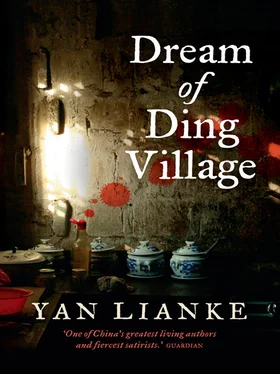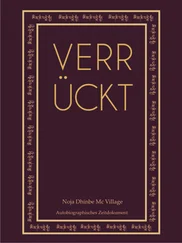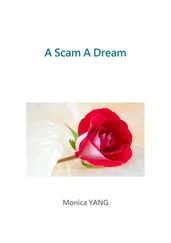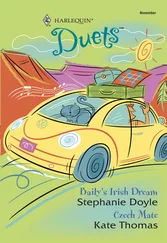Instead of splurging on a fancy meal, Grandpa thought they’d have been better off having noodles or turnip and vermicelli stew at home, but of course he didn’t say it out loud.
When they turned from the narrow lane on to a broad boulevard, Grandpa was shocked by what he saw. In the year since he had last visited the county seat, it had grown into a big city to rival the metropolis of Kaifeng. Forests of high-rise buildings and apartment blocks towered over a boulevard broad enough for seven or eight large trucks to pass abreast. Although it was night, the boulevard was as bright as day, illuminated by bunches of tiny white lights that hung like grapes from lampposts. Flashing green and red lights winked from lampposts and the trunks of trees. The city seemed unaffected by water shortages or dry spells. While drought had turned the countryside pale, here the grass, trees, flowers and shrubs were the colours they were meant to be. The trees lining the boulevard were so lush and green that they looked almost fake. The men and women Grandpa passed looked different, too. Not long ago, they had seemed a bit rustic, as if soil from the fields still clung to their skin. Compared to someone from Ding Village, they were city folk, but if you put them next to someone from a big city like Kaifeng, they would still look like villagers. But now you’d never know the difference: there wasn’t a trace of the countryside to be seen.
Despite the hot weather, all the young men seemed to be sporting thick-soled white trainers and had long, bleached hair. Female hairstyles, on the other hand, had got shorter. Some of the girls even wore crew cuts, which made it easy to mistake them for boys. But their short shirts and blouses were a reminder that they were girls, the kind of girls who weren’t embarrassed to bare their bellies to male passers-by, or show their navels to the world. Grandpa saw bellies decorated with brightly coloured tattoos of butterflies, dragonflies and birds. Some of the girls had piercings, too: sparkly gold and diamond jewellery that winked from their navels.
Although it had only been a year since Grandpa’s last visit to the county seat, it seemed like decades. The city had changed so much. As he trailed along behind my father, staring at the bright lights and tall buildings, he felt as if he’d stepped into a different world. Music blared from every shop and restaurant, making his heart race. Grandpa began to feel dizzy, so he asked my dad if they could go home. My dad led them away from the brightly lit boulevard and down a long, narrow alleyway hemmed in by high-rise buildings and paved with slabs of grey stone. After a while, they came to a large grove of trees. There were cypresses with thick trunks that a grown man couldn’t have put his arms around, and several gingko trees surrounded by protective metal railings. The gingkos were so enormous that it would have taken several people with outstretched arms to encircle them. Suddenly, through the trees, Grandpa saw a row of single-storey courtyard homes with grey brick walls and tiled roofs. All the homes were identical, and looked to be at least several hundred years old. The elaborately tiled rooftops had soaring eaves decorated with stone figures of lions, dragons and mythical beasts. When they came to the last house, they stopped and my mother unlocked the gate.
‘You live here?’ Grandpa asked, surprised.
‘This is where all the county cadres live,’ my dad answered.
Grandpa saw that my dad was smiling broadly, grinning from ear to ear. It was the same smile he had worn on his wedding day, the same smile he’d worn when his blood bank first turned a profit. As Grandpa stepped into the courtyard, he felt a rush of cool, moist air and the fresh damp scent of plants and trees. It was a scent that had all but disappeared from Ding Village, one that had been missing from the plain for months. In the centre of the courtyard was a large gingko tree with a thick crown of leaves that shone green under the moonlight. Judging by the size of the courtyard, Grandpa guessed that the house must sit on one mu of land, more than 5,000 square feet. The courtyard was paved with slabs of dark stone, and the rooms around it were fashioned from brick, with rooftops of glazed ceramic tiles. Although the house had an antique air about it, the scent of freshly baked tiles straight from the kiln made Grandpa realize that it had been built only recently. It was not a Ming or Qing dynasty courtyard home, but a cleverly wrought reproduction. Looking up at the gingko tree that shaded most of the courtyard, Grandpa couldn’t help but think of Uncle and Lingling’s coffins, which had been made of the same rare type of wood.
Grandpa followed my dad into the house, and was surprised by the understated decor. There was none of the sumptuous tackiness of the restaurant they had been to, nor anything remotely modern or flashy. Rather, it looked like a grand old family home of centuries past. All the furnishings were Ming or Qing dynasty pieces made from expensive red sandalwood or yellow pear. Richly grained tables, chairs, chaises and bookcases gleamed deep red or muted yellow in the light of frosted glass lamps, and the air was thick with the fragrance of wood. Standing in the spacious main room, Grandpa felt as if he’d stepped into some sort of temple. After my mother had served the tea, and my sister had left to do her homework, father and son sat down for a long, face-to-face chat.
My father motioned to a chair. ‘Have a seat, Dad.’
But Grandpa remained standing, staring at the walls of the room. While the exterior walls were grey brick designed to look old, the interior walls were newly painted, white as snow.
‘Did you build this house yourself?’ Grandpa asked.
‘Not just this house,’ my dad answered proudly. ‘I paid for the whole complex.’
Grandpa sat down. He no longer seemed surprised. With the air of a man confirming a long-held suspicion, he asked: ‘Did you pay for it with the money you earned selling coffins?’
Dad shot Grandpa a look. ‘That was about helping people. Those coffins were a once-in-a-lifetime opportunity.’
‘And did the money go to you, or to the government?’
‘If it all went to me,’ my dad grinned, ‘I’d own half this city by now.’
‘What about this new matchmaking scheme? Do the fees go to you, or to the higher-ups?’
The smile faded. ‘Like I said, it’s about helping people. The county pays me a salary, and I arrange matches for people who need them.’
After that, there was no more conversation. Darkness began to seep in from the courtyard, bringing with it a hint of rain. Grandpa went to the door and raised his head to the sky. Through the leaves of the gingko tree, he saw that the sky was crowded with stars: tomorrow would be another sweltering day. What Grandpa had mistaken for rain was nothing more than the night scent of the gingko.
It was after midnight, and time for bed. Dad led Grandpa to a bedroom in the south wing of the courtyard. It was smaller than the main room, but besides a large wooden bed, the decor and furniture were exactly the same.
As Grandpa was getting ready for bed, my dad surprised him by asking: ‘Dad, you’re not going to try to strangle me again, are you?’
Grandpa, caught off guard by this question, wasn’t sure how to answer. The hand that had been unbuttoning his shirt froze, and a blush rose to his cheeks.
Noting Grandpa’s embarrassment, my dad laughed. ‘I’m happy to let you stay in my house, as long as you don’t try to strangle me in my sleep. After all, it’s just one night. It’s the least I can do, as a filial son.’
Читать дальше












